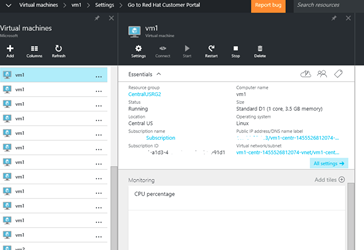Azure Opens Up With Expanded Linux Support

Microsoft has extended its embrace of open source tools on its cloud platform with a batch of Linux-based announcements, including deployment of Red Hat Enterprise Linux instances from its Azure cloud marketplace.
Microsoft (NASDAQ: MSFT) expanded its cloud partnership with Red Hat Inc. (NYSE: RHT) this week with the enterprise Linux announcement that allows deployment for production workloads along with development and testing. Microsoft said more than 60 percent of Azure marketplace images are now Linux-based.
The partners said access to Red Hat's flagship Linux platform on the Azure cloud would combine security and reliability features with public cloud scaling. They added that the partnership would accelerate the shift to an "open hybrid cloud."
RHEL 6.7 and 7.2 images are now live on all Azure regions except China and U.S. government agencies.
Industry analysts noted that the Microsoft announcement begins to deliver on its cloud partnership with Red Hat announced last fall. "Microsoft has clearly come to the realization that it can only compete in the cloud by being a universal player," noted IDC's Al Hilwa. Red Hat's technology "is entrenched. So a new world order is upon us, and one that is good for the two company’s mutual customers."
Microsoft also said Wednesday (Feb. 17) it is certifying other Linux images created by Bitnami. The library of server applications and application development tools run on Linux as well as Windows servers, along with Azure and other leading cloud platforms. The new Linux images are available now on the Azure marketplace.
In a blog post, Corey Sanders, director of program management for Azure, noted that Microsoft's open-source push also includes partnerships with Cloudera, Datastax, Hortonworks, MarieDB and Pivotal.
The software giant separately announced a partnership with Walmart to offer an open source cloud and application management platform. Azure support for the Walmart (NYSE: WMT) tool would enable hyper-scale public cloud deployment while Walmart continues to use OpenStack for its private cloud, the retailer said.
Finally, Microsoft also made good on its earlier backing of Linux-based application containers with a preview of its container service designed to create and manage clusters of Azure virtual machines preconfigured using open source tools.
"Containers have already been adopted in many development shops as they simplify the process of building, shipping and running applications," Sanders noted. "However, running containers in the cloud means working in a distributed environment across multiple hosts."
The application service builds on collaboration with container leader Docker and orchestration specialist Mesosphere to provision clusters of Azure VMs designed to deploy application containers. The new service integrates Mesos container orchestration along with Mesosphere Marathon and Docker Swarm clustering tools.
Microsoft and Mesosphere announced plans last August to support Apache Mesos container orchestration for Windows.
Microsoft is ultimately betting its embrace of open source technologies like Linux containers will help differentiate the Azure cloud from formidable competitors like Amazon Web Services (NASDAQ: AMZN) and Google (NASDAQ: GOOGL). Given widespread enterprise use of Windows applications, its announcement last summer that Windows Server 2016 would support Docker was widely viewed as hastening its shift to open source.
Related
George Leopold has written about science and technology for more than 30 years, focusing on electronics and aerospace technology. He previously served as executive editor of Electronic Engineering Times. Leopold is the author of "Calculated Risk: The Supersonic Life and Times of Gus Grissom" (Purdue University Press, 2016).











